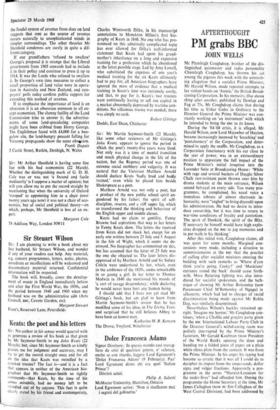Sir: Mr Martin Seymour-Smith (22 March), like some other reviewers
of Mr Gittings's John Keats, appears to ignore the period in which the poet's twenty-five years were lived. Not only was it a time of mental transition and much physical change in the life of the nation, but the Regency period was one of extreme social snobbery and vulgarity. It was natural that the Victorian Matthew Arnold should declare Keats 'badly bred and badly trained,' even while he placed him beside Shakespeare as a poet.
Matthew Arnold was not only a poet, but a product of the new public school spirit en- gendered by his father; the spirit of self- discipline, reserve, and a stiff upper lip, which so transformed the thinking and behaviour of the English upper and middle classes.
Keats had no claim to gentility. Fanny
Brawne had aspirations that way as her letters to Fanny Keats show. The letters she received from Keats did not shock her, except for an early one written between 25 July and 5 August in the Isle of Wight, which it seems she de- stroyed. No biographer has commented on this, but has assumed that the letter of 25 July was the one she objected to. The later letters dis- approved of by Matthew Arnold and Sir Sidney Colvin were understood by her, which, even in the ambience of the 1820s, seems remarkable in so young a girl. In her letter to Thomas Medwin in 1840 she mentioned his moods of 'a sort of savage despondency,' while declaring he would never have hurt any human being.
I should add that I have not yet read Mr Gittings's book, but am glad to learn from Martin Seymour-Smith's review that he has modified some of his ideas in The Living Year, and surprised that he still believes Abbey to have been an honest man.






































 Previous page
Previous page